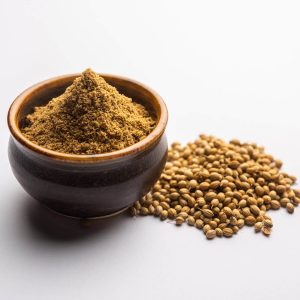Coriander Seeds: A Complete Guide to Their Health-Boosting Properties

Coriander is the seed from the cilantro plant. The ancient spice, which has been around since biblical times, may not be recognizable to you unless you’re a fan of such cuisines as curry or masala – coriander is a must-have spice in both.
Coriander seed has a long history of being used as a flavoring agent and as a home medicine for both digestive problems and cold relief. As a spice, it is sold whole or ground; its flavor is a citrus/sage/powdery caraway.
Health Benefits Of Coriander Seeds
Lower Blood Sugar
Coriander seed oil and coriander essential oils have a therapeutic effect on your body by lowering blood sugar levels. It is important for people with low blood sugar, taking medicines that lower the level of sugar in the blood, or about to undergo surgery to watch their intake of this spice.
If you are looking for a more natural way to manage your diabetes and lower blood sugar, try including more coriander in your meals. There was one research that indicated the ability of coriander to enhance carbohydrate metabolism and improve hypoglycemia in rats.
Ease Digestive Discomfort
One cause of IBS is bacteria, a painful and embarrassing condition that affects 1 in every 5 Americans.
Researchers discovered that coriander can act as an antibacterial, thereby easing the muscle tightness in colon and stomach inflammation which are responsible for IBS and other gut conditions.
The study involved 32 adults with IBS, who participated in it according to the Journal of American College of Gastroenterology. These participants were asked to take a coriander-containing product or a placebo.
Decrease Blood Pressure
It’s true, this spice lowers blood pressure which makes it a godsend for hypertensive patients. How does it do this? Aside from positively regulating gut activity, this spice also has diuretic effects which is great for hypertensive patients.
When you treat hypertension you also prevent increasingly serious conditions such as blood clots, and stroke.
Improve Cholesterol Levels
According to some studies, adding coriander to your diet can reduce your bad cholesterol levels. In one animal study, Coriander seeds were shown to reduce levels of bad cholesterol (LDL) and raise levels of healthy cholesterol (HDL).
Help Urinary Tract Infections
The bacteria causing the urinary tract infection can be blocked by coriander seeds to lessen the UTI symptoms. Add 2 cups of water in a vessel and mix them with 1.5 teaspoons of dried seeds then allow it to soak overnight.
Strain and drink as tea, or add to a morning smoothie to help reduce UTI discomfort and aid in the healing process.
Support Healthy Menstrual Function
The seeds of coriander may aid in the proper functioning of the endocrine glands and the hormones responsible for the menstrual cycle. Coriander may also be beneficial in the treatment of menorrhage.
May benefit heart health
The animals and test tubes have shown that coriander reduces risk factors for heart disease like heightened blood pressure and LDL cholesterol. It is the extract of coriander that is also believed to enable the body to get rid of sodium and water by reducing bloat or diuretics as they are otherwise known.
Some animal studies have also shown that coriander’s cholesterol-lowering effects. One study in rats found that much the same, it significantly reduced LDL cholesterol and increased HDL, or “good,” cholesterol.
May protect brain health
Brain diseases such as Parkinson’s disease, Alzheimer’s disease, and multiple sclerosis are all linked to inflammation. The anti-inflammatory properties of coriander may protect against these conditions.
Easy to add to your diet
The leaves and seeds of the coriander plant taste very different. The mild, earthy whole coriander seeds are so warm that they’re famous for baking but they’re made for much more: whole ones are also divine on pickled vegetables and in rubs, and ground ones are powerful in cooked lentils. Warm them to release the scent and grind them into pastes and dough.
The pungent, citrusy coriander leaves are also called cilantro and you can garnish your soup, or toss them into a cold pasta salad, lentil salad, tomato salsa, or Thai noodle dish. Or blend them with garlic, nuts, coconut milk, and lemon juice and make a paste that you use as a burrito, salsa, or marinade.
May protect your skin
Coriander may also help ward off skin irritations, and mild rashes like dermatitis. In research, the extract alone didn’t do the trick with diaper rash in infants, but it may work in conjunction with other soothing compounds as an alternative.
Coriander extracts may help protect against cellular damage that speeds up skin aging and skin damage caused by UV B radiation, according to other research.
Many people use coriander leaf juice to treat skin conditions like acne, discolored and oily as well as dry skin, however, “Few research studies have looked into these uses,” Marrelli says.
Nutrition Facts
A teaspoon of coriander seed contains approximately:
- 15 calories
- 2.8 grams carbohydrates
- 2.1 grams fiber
- 0 grams sugar
- 0.9 gram fat
- 0.6-gram protein
- 0.8 milligram iron
- 16 milligrams magnesium
- 35 milligrams calcium
- 20 milligrams phosphorus
- 1-milligram vitamin
The volatile oil of Coriander is rich in phytonutrients like carvone(50%), geraniol, limonene, borneol, camphor, elemol, and linalool. It also contains flavonoids such as quercetin, kaempferol, rhamnetin, and apigenin; and active phenolic acids including caffeic and chlorogenic acid.
Final Thoughts
Coriander seeds are known for a lot of health benefits such as supporting healthy blood sugar, and cholesterol levels, reducing blood pressure, and soothing any digestive issues. It also has properties that can prevent food poisoning. The ground coriander spice is perfectly suited for flavoring Indian cuisine – in the form of curries or masalas.






